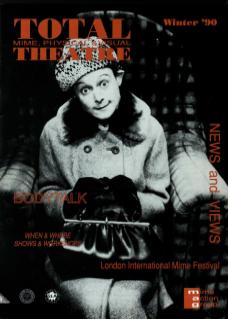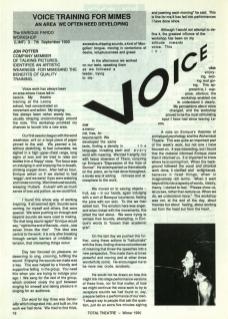Voice work has always been an area where I have felt insecure. My theatre training at the Lecoq school had concentrated on movement and action. My singing has always been rather weedy too, usually straying unconvincingly around the note. This workshop provided my chances to launch into a new area.
Our first session began with the word weakness writ on a large piece of paper pinned to the wall. We yawned a lot, without stretching, to feel vulnerable, we sighed in a high upper-chest range, long sighs of loss and we tried to relax our bodies in to a ‘floppy’ state. The focus was on indulging in and enjoying the in-breath, drinking oxygen down. After half an hour, Enrique asked us if we started to feel ‘soggy’, and we were! Eyes were watering and noses running. We introduced sounds, weeping ‘rhubarb rhubarb’ with as much sense of loss and pathos as we could find.
I found this whole way of working inspiring. It all seemed right. Sounds were coming, for myself and others, that were special. We were pushing on through and beyond sounds we were used to making. ‘Do that long sound again,’ Enrique would say, ‘right to the end of the note… more… now seven times like that.’ This idea was central to the work: it is only after breaking through certain barriers of inhibition or tension, that interesting things occur.
Day two focused on pleasure, on deserving to sing, crooning, fulfilling the sound. Enjoying the sounds we made was a key. This was helped by a friendly and supportive feeling in the group. You need this when you are trying to indulge your ego! We sang for the rest of the group, which crossed nicely the gulf between singing for oneself and taking pleasure in singing for an audience.
Our word for day three was Sensuality which integrated into, and built on, the work we had done. We tried to find thick, excessive, dripping sounds, a kind of ‘Mongolian’ tongue, moving in contortions of desire, voluptuousness and greed.
In the afternoons we worked on our texts, speaking them as we followed a leader, trying to discover a mercurial, free, Arlequino spirit. We developed the same texts, finding a density in the language, investing each and every word with meaning. We tried it angrily, but with the heavy slowness of Titans, conjuring up Enrique’s ‘Depression of the Vale of Sorrow’. He accompanied us thematically on the piano, as he had done throughout, a lovely way of adding richness and atmosphere to the work.
We moved on to seizing objects – fruit, say – in our hands, again indulging with a sort of Baroque luxuriance, feeling the juice with our skin. To this we then added text. The emotion here was anger, and when linked with the movements, this jolted the text about. We were trying to escape their bounds, attempting, in Enrique’s words to ‘loosen their academic grip’.
On the last day we pushed this further, using these actions to ‘hallucinate’ with the lines, finding chance coincidences of meaning that threw the speeches into a new perspective. This made them at times powerful and moving and at other times wonderfully comic. He encouraged me to be more raw, crude, acrobatic.
He would not be drawn on how this might link into stage performance versions of these lines, nor, for that matter, of how we might continue the voice work to try to recapture sounds we had found or, say, prepare before a performance of our own. ‘I always say to people that ask the question, just do an extra five minutes sighing and yawning each morning,’ he said. This is fine for me. It has fed into performances I have done since.
Although I would not attempt to define it, the greatest influence of the workshop has been on my attitude towards voice. This involves enjoying, seizing and giving. This approach is, I suppose, obvious; the workshop enabled me to understand it clearly. My perceptions about voice changed, and the workshop proved to be the most stimulating input I have had since leaving Lecoq.
A note on Enrique’s theories of archetypal psychology and the Alchemical Theatre. This was quite an important part of the week’s work, but not one I have focused on. It was interesting, but I found that the material informed Enrique more than it informed us. It is important to know where he is coming from. When the background followed the vocal and physical work done, it clarified and enlightened, because it fixed things, often in imaginatively rich terms. When it went beyond this into a tapestry of words, history, theory, I started to feel, ‘Please show us, let us see, rather than lecture us. When we do, we understand more.’ The workshop was not, at the end of the day, about theories but about feeling, about working not from the head but from the heart.

